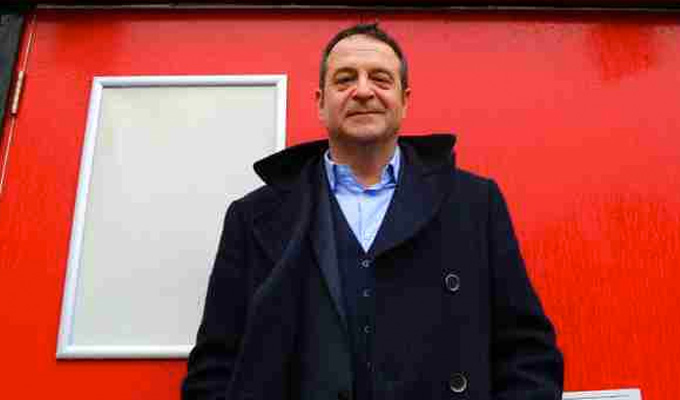
Mark Thomas: The Red Shed
Note: This review is from 2016
Review by Steve Bennett
‘This is a show about the miner’s strike,’ Mark Thomas tells us. ‘But there is no brass band music or kids discovering a penchant for ballet.’
There is, though, a memory as poignant and emotive as any movie climax. He remembers the time, when he was a student and newly awakened political activist, when he joined miners on their march back to work after losing the brutal year-long dispute. As the group walked solemnly but proudly through a Yorkshire village, whose name is now lost to him, Thomas vividly recalls passing a school where a chorus of under-tens sang from the playground the workers’ anthem Solidarity Forever, an inspirational glimmer of hope for the future in the face of defeat that brings a lump to the throat even now.
It is a beautiful image. But is it true? Or has Thomas mythologised his own origin story, looking back through Red Rose-tinted spectacles, and in its constant retelling convinced himself this fantasy is real.
The Red Shed charts his quest to try to determine the truth, 30 years on, so fits into his fine tradition of politically inspired comedic documentaries. But more than that, it is also about the potency of stories and the importance of truth… ideas that have never been more relevant in the wake of the Brexit campaign, when control of the narrative was key, and facts in short supply.
Thomas feels a pressing sense of duty to discover what really happened that day in 1985, partly for his own satisfaction and partly because he wanted to create a show to mark the 50th anniversary of the actual Red Shed, a modest Labour club in Wakefield where he began his performing career and whose active political community germinated his socialist principles.
The comedian’s trips back to the area to try to find that school intertwine with visits to the club. He took a digital recorder with him to document key moments in the quest; with the main players in the story represented by volunteers from the audience, holding cardboard masks over their faces, a subtle but effective bit of theatricality. Through his conversations, he finds the shed’s place in history, as well as wondering about its future, and whether it has one.
Such musings, though, are secondary to the play’s main aim: to tell its own story, of Thomas’ quest for the Holy Grail of truth. Can he find that school, or anyone who can verify the romantic story that inspired him?
He is a superlative storyteller, whipping from poignancy to laughter in the twist of a punchline. He can hold a silence, then, after the perfect pause, whisk us back into the pacey narrative, like a roller-coaster teetering at the peak of its track, all the while evoking a strong sense of the communities he’s returning to and the characters that have helped form his views. These fresh images are made real in all our minds, as we hang on the twists and turns of his investigation, sharing in his curiosity, passion and punchy wit.
A story about stories needs its own power, and Thomas doesn’t slack with a heartfelt yarn that will compel until its emotional payoff, whether you share his politics or not.
Review date: 24 Aug 2016
Reviewed by: Steve Bennett
Reviewed at:
Traverse Theatre








